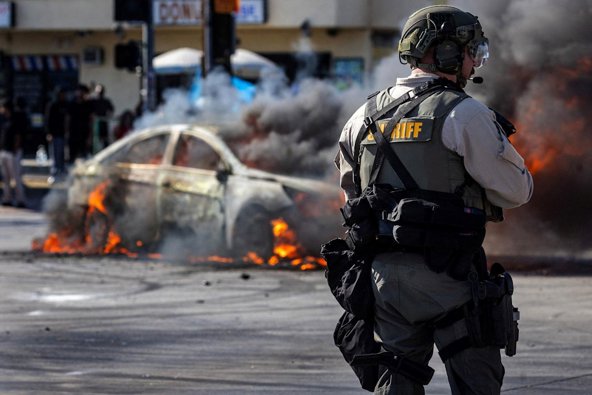
LA Riots Prompt GOP Immigration Crackdown
Republicans push new immigration bills as riots erupt in LA over ICE actions; Trump deploys troops amid Democrat resistance.
Republicans Advance Immigration Bills Amid Violent Protests
As violent anti-immigration enforcement protests continue to roil Los Angeles, Republican lawmakers in Congress have introduced a series of legislative responses aimed at restoring order and enhancing immigration control. These actions come as thousands of National Guard troops and 700 Marines were deployed by President Donald Trump over the weekend to support federal agencies and protect infrastructure in the city.
One major legislative push comes from Rep. Dan Crenshaw, R-Texas, who is spearheading a bill that would make non-citizens—including legal residents and DACA recipients—eligible for deportation if convicted of assault or violence against law enforcement officers during national emergencies. “If you're here legally and rioting against police during a declared emergency, you've broken the social contract,” Crenshaw said, arguing that legal status should be revoked in such cases.
The proposed bill would permanently bar deported individuals from reentering the United States. Crenshaw stated that the White House is “excited” about the legislation, which is seen as part of the administration’s broader effort to restore security amid unrest triggered by Immigration and Customs Enforcement (ICE) operations.
RIPPLE Act Expands Local Immigration Enforcement
In the Senate, Sen. Ashley Moody, R-Fla., introduced the RIPPLE Act—short for “Reimbursement Immigration Partnerships with Police to Allow Local Law Enforcement.” The bill would expand the 287(g) program, allowing state and local police departments to participate in immigration enforcement efforts and receive federal reimbursement for personnel and overtime costs.
Rep. Laurel Lee, R-Fla., introduced a companion bill in the House. “Local officers are on the front lines of chaos,” Lee said, noting that the RIPPLE Act would ensure local departments have the resources to support federal authorities. Both lawmakers emphasized the urgent need to empower all levels of law enforcement in the face of mounting violence.
Sen. Moody also unveiled the “Stop GAPS Act,” which would overhaul how the Office of Refugee Resettlement places unaccompanied minors. The bill would require the agency to coordinate with states and track placements more closely to prevent abuse and trafficking, a system Moody claims has broken down under previous administrations.
Resolution Condemns Violence, Presses Local Leaders
In response to the growing unrest, Rep. Young Kim, R-Calif., introduced a resolution—signed by all California House Republicans—that condemns the violence and urges local leaders to cooperate with federal authorities. The resolution supports peaceful protests but warns that arson, vandalism, and attacks on law enforcement have “spiraled out of control.”
Los Angeles Mayor Karen Bass and California Governor Gavin Newsom have criticized the federal response, arguing that the presence of military forces has inflamed tensions. Newsom maintains that local law enforcement can handle the crisis, though the LAPD has reported escalating violence and overwhelmed resources.
Images from the riots include burning vehicles, masked demonstrators waving foreign flags, and assaults on law enforcement near federal buildings. The administration’s decision to deploy Marines has drawn further criticism from Democratic officials, even as Republicans claim such action was necessary to secure the city and deter further attacks.
With Congress advancing legislative measures and the White House standing firm on enforcement, the situation in Los Angeles has become a flashpoint in the national immigration debate. As legal battles and political tensions intensify, lawmakers on both sides are bracing for continued conflict over the scope and execution of federal authority during civil unrest.






